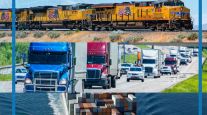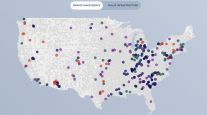National League of Cities Says New Federalism Is Emerging
“Paying for Local Infrastructure in a New Era of Federalism,” released by the NLC on May 16, says that a patchwork of taxes and fees will only go so far.
“Our focus is the relationship between cities and our state and federal partners,” NLC Executive Director Clarence Anthony said on a conference call with reporters.
Chris McKenzie, the executive director of the League of California Cities, termed the state of the nation’s infrastructure “a very, very serious crisis.” McKenzie said poor road conditions cost each California driver an estimated $762 annually. He added that the state has a $99 billion funding shortfall for its roads in part because half of the money for transportation in California comes from local sources.
INFRASTRUCTURE WEEK COVERAGE: Via TT's Capitol Agenda
“In this era of declining revenues, cities cannot wait to see what the federal government is going to try to do to help,” said Mark Stodola, the mayor of Little Rock, Arkansas.Our NEW REPORT compares local #infrastructure funding options in all 50 states: https://t.co/6TSaRNGywu pic.twitter.com/EejcYB3Mfr — NLC (@leagueofcities) May 16, 2016
According to the NLC, local sales taxes for transportation are authorized in only 29 states, with 18 of those requiring voter approval. Sixteen states authorize local fuel taxes and voter approval is needed in eight states; 26 states authorize local motor vehicle registration fees and voter approval is required in eight states. Thirty-two states have infrastructure banks, but only 13 make such funds available for all types of infrastructure.
After the NLC session, U.S. Secretary of Transportation Anthony Foxx gave a brief presentation about the critical role that transportation plays in connecting communities.
“At USDOT we’re trying to change the transportation landscape for the next generation,” said Foxx, who this week will visit the seven Smart City finalists competing for up to $50 million in funding. “Transportation connects people to opportunity and can invigorate opportunity within communities. … Transportation facilities should be built by, for, and with the communities impacted by them.”




